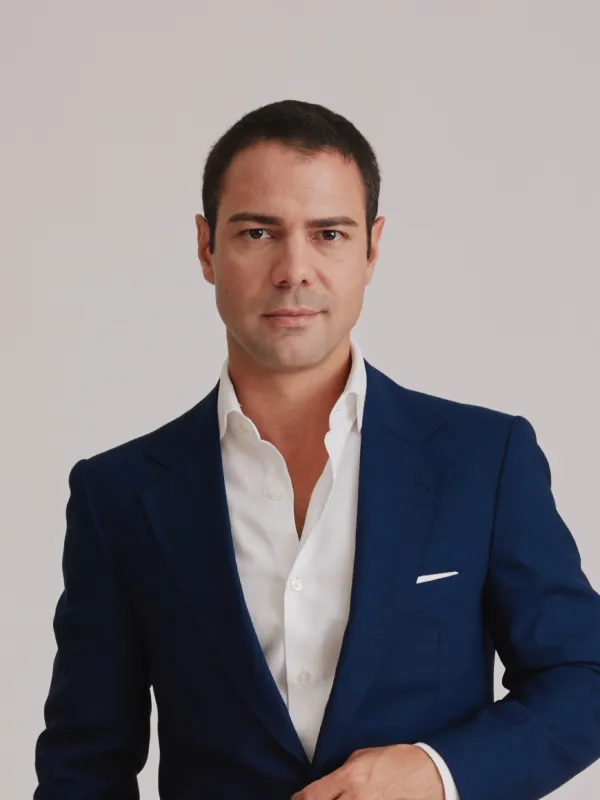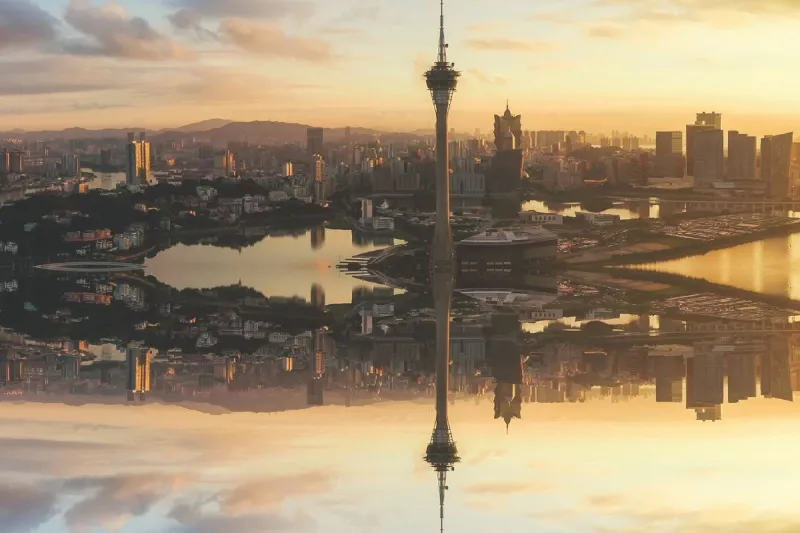Rui Proença interviewed by Asian Legal Business | Macau Regional Report
Innovation beyond casinos | ALB China July Macau Report
Macau's legal market – one of China's most mature yet insular – is experiencing a quiet revolution as the city's ambitious economic diversification strategy creates new opportunities beyond its traditional gaming and real estate strongholds. With 458 licensed lawyers serving a population of nearly 688,000, this Portuguese-influenced enclave is witnessing consolidation among its 104 homegrown law firms while pioneering cross-border legal services that bridge East and West in the rapidly integrating Greater Bay Area.

Anyone who has visited Macau will have noticed the city’s unique blend of Chinese bustle and Portuguese flair, and the nonstop energy of its casinos. Its distinctive history has shaped a singular industrial structure and social atmosphere, both of which have influenced the development of its legal services market.
According to data from the Macau Lawyers Association, as of July 1, the city had 458 licensed lawyers and 145 trainee lawyers serving a population of approximately 687,900. This equates to 8.76 lawyers per 10,000 residents—one of the highest ratios in China, indicating a relatively mature legal industry.
Another defining trait of Macau’s legal market is that it remains closed to foreign entrants. “You have to be a Macau-qualified lawyer to establish your practice here,” explains Rui Proença, managing partner at MdME. “So technically there are no foreign firms, and that has translated into practice as well.”
All firms operating in Macau are locally founded, even if they have Portuguese or Chinese partners. As such, there are no branch offices of international or mainland Chinese firms in the jurisdiction.
Currently, Macau has 104 law firms, most of which are small or mid-sized. Only a handful have grown into larger players. “There are four firms with over 30 lawyers, including ours,” says Proença. “Then there’s a tier of mid-sized firms with 15 to 20 lawyers—but not many. Below that, you find small firms, some of which are successful boutiques.”
One such boutique is CFB Legal, founded in 2021 by three lawyers aiming to capitalize on the integration opportunities within the Greater Bay Area and the Hengqin Cooperation Zone. Today, the firm has five lawyers.
Commenting on the overall legal landscape, Hugo Maia Bandeira, one of CFB’s founding partners, notes that Macau’s “rigid” market offers both advantages and challenges. “On the one hand, the relative predictability of demand offers a degree of stability that many firms in other jurisdictions might envy. On the other, the slow pace of regulatory change and limited diversification in legal needs can make innovation more difficult,” he says.
“That said, firms willing to look beyond the traditional scope of legal services—by integrating compliance advisory, tech adoption, or regional cooperation—can find ways to evolve. For us, it’s a matter of using the market’s rigidity as a foundation, not a ceiling.”
Proença adds that the future will likely see more consolidation, especially as the market adapts to increasing demand from complex cross-border projects under the Greater Bay Area initiative. “We completed a merger with DSL Lawyers in 2023, the first of its kind in Macau” he notes. “It’s been very successful, so I think there's space for more of that to happen as the market develops.”
Disruptive moment
In 2024, Macau’s GDP reached 403.3 billion pataca ($50 billion), effectively returning to pre-pandemic levels. Alongside the gradual recovery of traditional sectors, another major economic shift has been the rollout of Macau’s first comprehensive industrial development plan.
In late 2023, the Macau SAR government introduced the “1+4” strategy for moderate economic diversification. The “1” refers to strengthening Macau’s position as a world centre for tourism and leisure; the “4” encompasses four emerging sectors: healthcare, modern finance, high-tech, and the culture, sports and entertainment industries.
These economic developments are increasingly reflected in the legal sector. “Core practice areas in Macau still revolve around commercial and corporate law, gaming, real estate, and litigation,” says Maia Bandeira. “A significant portion of our work remains centred on the gaming and hospitality sector, which continues to be the backbone of the local economy. We provide comprehensive legal support on everything from licensing and regulatory compliance to labour matters and dispute resolution.”
However, he also observes rising demand in other areas. “Compliance and cross-border advisory services—especially those involving interactions with Mainland China—are definitely growing.”
Proença points to the rapid changes underway even within traditional industries. “Some of the mid-sized firms were doing a lot of work in real estate and for junket operators and the small local casinos—the so-called satellite casinos. But the real estate market has been very subdued, like in the mainland and Hong Kong, and those types of clients are being phased out.”
He explains that under the 2022 revision of the legal framework for casino operations, only properties owned by concessionaires can host gaming facilities. With a three-year transition period in place, all satellite casinos will cease operations by the end of 2025. “So the local firms servicing these clients are losing that work,” says Proença. “It’s drying up.”
“I think it's a tough proposition for mid-sized firms. If your ambition is to serve international clients or clients with international standards, you need a certain size to offer the full range of services and expertise they require. Otherwise, you're better off being a boutique specializing in a particular area,” he adds.
This, he argues, is why consolidation will likely continue—and why larger firms may potentially dominate more market share in the coming years.
New areas
As Proença puts it, while Macau’s economic fundamentals remain largely unchanged, law firms must stay vigilant and think ahead if they want to stay relevant. “Macau is a market where it’s easy to get comfortable,” he notes. “As a local firm, we need to look outside for inspiration and challenge ourselves to meet the highest regional standards—looking at Hong Kong or the mainland firms. If you stop developing, you stagnate.”
Maia Bandeira agrees. He observes that as Macau’s economy evolves, so does CFB Legal’s client base. “We regularly advise clients in the real estate and construction sectors, particularly on property transactions, project development, land use rights, and leasing arrangements. The retail and F&B industries also make up a notable segment of our portfolio, where we assist with commercial agreements, franchising, brand protection, and operational structuring.”
“In the financial services space, we support several banks offering guidance on regulatory frameworks, AML/CFT compliance, and data governance,” he continues. “In recent years, we have also seen increased interest from companies in the healthcare and digital innovation sectors—many of whom are exploring opportunities linked to the GBA development and the diversification of Macau’s economy.”
A growing number of clients are also involved in cross-border transactions, particularly those between Macau and Mainland China. “This often requires us to handle complex multi-jurisdictional matters and collaborate closely with counterparts across the border,” says Maia Bandeira. “We advise on structuring strategies, regulatory navigation, investment approvals, and dispute resolution, ensuring our clients remain compliant while pursuing regional growth and integration.”
At MdME, innovation has long been a core part of the firm’s DNA. “We are better prepared to adapt and thrive with the market changes,” says Proença. “For example, we’ve developed our expertise in compliance—including data protection, consumer protection, and cybersecurity—where we’ve taken a market lead.”
Another area of growth has been the bond market. “It’s something we’ve worked on for five or six years now,” he explains. “We’ve been involved in a number of issuance projects—by corporates, banks, even mainland provincial and central government entities. It’s not as mature a market as Hong Kong’s or Singapore’s, but there’s been consistent development, supported by government, underwriters, and law firms alike.”
Opportunities under the diversification strategy
Meanwhile, although Macau’s economic diversification will be a gradual process, signs of change are already emerging. “We’re seeing early signs of increased demand for legal support in these sectors,” says Maia Bandeira. “Clients entering or expanding in areas such as digital payments and medical services are seeking advice on licensing, data protection, tax incentives, and regulatory compliance.”
The development of the Hengqin Cooperation Zone is also opening new channels for legal work. “We’re advising on joint ventures, IP structuring, cross-border investment, and other matters,” he says.
Proença also sees concrete momentum in two of the four designated sectors. The first is modern finance. “We’ve seen a few initiatives rolled out—from the bond market to the 2022 Trust Law, and now a new investment fund framework is on the way,” he says. “There’s a draft bill under review in the Assembly this year. If we can find a way to unlock capital that’s in Macau and put it to good use, I think there could be some traction there.”
“I’m quite interested to see how the new investment fund framework plays out. It’s important to modernize Macau’s financial system to better serve its economy and citizens,” he says.
Proença points to Micro Connect—founded by former HKEX CEO Charles Li—as an example of how Macau can serve as a base for innovative financial products and services. “It’s one that has been generating real business and real legal services on the ground,” he says.
The second area he highlights is culture and sports. According to a report by China Newsweek, over the past year, Macau has hosted major concerts by many popular stars. Currently, the city hosts three to five concerts every week. In 2023, concert ticket revenues alone reached 2.35 billion pataca, helping to revive tourism and gaming-related industries.
“This isn’t a completely new industry—it builds on the tourism sector Macau already has.” He adds that When casino operators renewed their licenses in 2022, they committed significant capital to non-gaming activities. A lot of that investment is going into entertainment and sports, and operators are now bringing in events like the NBA, UFC, major concerts, and art exhibitions.
“We’ve been doing quite a lot of work in that space,” says Proença. “These clients need support with commercial contracts, intellectual property, tax, and employment. I’m very bullish on this area—I can already see it happening, and I believe it has the potential to grow.”
Originally Published in ALB Website | ALB-CHINA-JULY-2025 | Innovation beyond casinos by By Hu Yangxiaoxiao



